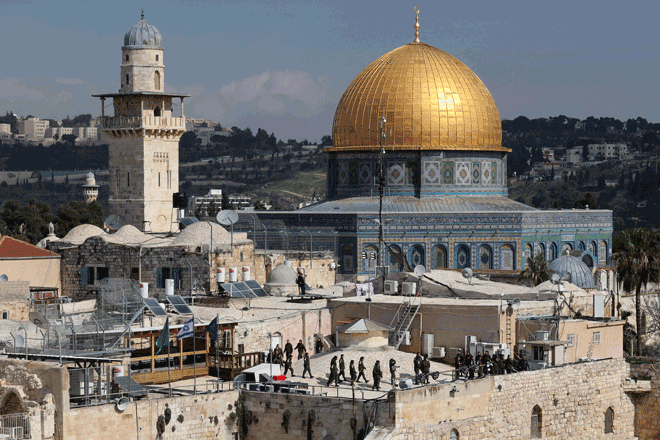You are here
Israel dismantles provocative new Al Aqsa ramp
By AFP - Sep 10,2014 - Last updated at Sep 10,2014
OCCUPIED JERUSALEM — Israel on Wednesday dismantled a newly erected wooden access ramp to Jerusalem's Al Aqsa Mosque compound that would have increased access for non-Muslims but angered Jordan, an AFP correspondent said.
The half-built structure was erected by Israel in the midst of the Gaza conflict in early August, triggering outrage from Jordan which oversees Muslim heritage sites in Jerusalem.
It ran alongside a bigger wooden structure — the Mughrabi ramp — that leads from the Western Wall plaza up to Al Aqsa Mosque compound in Jerusalem's Old City.
The Mughrabi ramp is the only access to the plaza for non-Muslims.
Anything that is viewed as changing the status quo in or around the flashpoint Al Aqsa compound, which houses the third-holiest site in Islam, is highly sensitive and triggers a strong response from Jordan.
Last week, Israeli Prime Minister Benjamin Netanyahu ordered that the new structure be removed, saying its construction was "illegal" and had never received the proper authorisation, a government source said.
That move was hailed by Jordan and by Wednesday afternoon most of the new ramp had been taken down, the AFP correspondent said.
Jordan, the custodian of the Muslim holy places in Jerusalem, insists that since the ramp leads to the mosque compound, it should manage or at least be consulted over any new construction plans.
No coordination
Archaeologist Yonatan Mizrahi who runs Emek Shaveh, an Israeli NGO opposed to the "politicisation" of archaeology, said the structure was believed to be the beginning of a permanent ramp built "without coordination with the waqf or with Jordan."
Jordan's waqf is the religious body that oversees the compound and other Islamic sites in Jerusalem.
"We think it was the start of a new, permanent ramp," he told AFP.
The existing Mughrabi ramp, which is also wooden on a metal framework, was built in 2004 after its predecessor collapsed.
Negotiations between Israel, Jordan, Washington and other players over a permanent replacement began in 2007.
Although the sides came close to reaching a deal, the talks ultimately collapsed and the plans were never signed off, Mizrahi explained.
The ramp whose construction began in early August was located at the exact site where the permanent structure was to have stood, he said.
Amman’s authority over the Muslim holy sites in Jerusalem is anchored in the 1994 Israeli-Jordan peace treaty.
In 2011, the UN cultural agency (UNESCO) decided that all parties should be involved in the ramp’s design process and that neither side should take any unilateral actions that could affect the character of the site.
“Any unilateral move is perceived as a violation of the agreements between the two countries,” an Emek Shaveh paper said.
“As long as the Muslim Waqf feels that its position on Haram Al Sharif [the compound] is undermined, it would be difficult to present the construction of the ramp as an action that is not part of a specific political goal.”
Known to Muslims as Haram Al Sharif, the sprawling plaza at the southeastern edge of the Old City houses Muslim holy sites the Dome of the Rock and Al Aqsa Mosque.
The plaza is also considered the holiest place in Judaism as they believe the site was the location of the first and second Jewish Temples.
To one side of the plaza stands the Western Wall, currently the holiest site at which Jews can pray.
Related Articles
OCCUPIED JERUSALEM — At Jerusalem’s Western Wall plaza, a recent excavation has alarmed some heritage specialists who fear the traces of a c
Israel on Wednesday started dismantling the wooden ramp recently built at Bab Al Magharbeh in occupied Jerusalem, following pressure from Jordan and international entities, Israeli media reported.
A far-right Israeli Cabinet minister on Sunday paid a brief visit to the flashpoint Al Aqsa Mosque compound in Jerusalem’s Old City, an Israeli security official said.

















